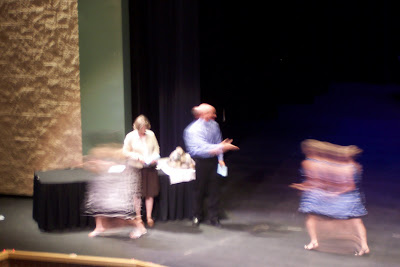When I first began teaching, I tried to have all my semester grades turned in before commencement, so that I could enjoy a sense of closure as I sat there in my academic regalia and watched graduating students stride down the field house aisle and into their future. These days, I don’t even bother to try to hit that deadline. I’m so slow and tired by the end of the academic year; I can’t push myself hard enough to make it. Instead, I usually stumble along right up to the Wednesday after commencement weekend, when the registrar insists we turn in our final grades.
I suppose I have simply gotten used to unfinished business. As more academic years slide past and pile up behind me, I have less a sense of closure in May than a sense of constant motion. Even this year, when two of my own children are graduating—one from high school and one from middle school—I’m having a hard time savoring the moment. It all seems to be flying past me in a blur.
Perhaps this is why Psalm 90 has been on my mind, a psalm about the passage of time, the ephemerality of life. For God, a thousand years are like a day, and our little human lives are quick as a breath and no more substantial. Humbled by this reflection, the psalmist pleads, “Teach us to number our days aright, that we may gain a heart of wisdom.” Teach us how very small we are. Melt our self-importance away in the light of divine perspective.
I’ve always loved how this psalm ends. At first glance, it seems to shift topics. “May the favor of the Lord our God rest upon us; establish the work of our hands for us—yes, establish the work of our hands.” Where does work come into this? After meditating on the brevity and sorrows of life, now we’re talking about the “work of our hands”?
Yes. Exactly. This is how we make meaning out of years “whose span is but trouble and sorrow, for they quickly pass, and we fly away.” We busy ourselves with “the work of our hands.” That’s what the favor of the Lord looks like: something to do in life, a meaningful task. The Hebrew word for work is very general—it simply means “activities” or “deeds,” not only tasks at work or home but all our interactions with others, all the ways we weave ourselves into the world.
Whatever it is we do, though, our business will always be unfinished. I think of this as I close the books on one semester and notice another one appearing the horizon. I think of this as our graduates move on, so many papers and projects behind them and so much life ahead of them. I think of this as a parent, as I wonder if I’ve done enough and taught my children enough and equipped them with everything they need for the next stage.
The answer to that, of course, is no. That is why we need the prayer at the end of this psalm, and we need to pray it twice: “Establish, yes, establish.” The favor of the Lord looks like work, but the outcome of that work is the Lord’s. We cannot ever do enough, and we cannot know what the work of our hands will mean to others, not fully. That is in the hands of God.
In the end, this is a psalm about letting go in trust. So hard to do, but what choice do we have? We can only try to be faithful, and then let go with a prayer: “May the favor of the Lord rest upon us.”





